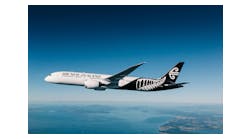March 20--European plane maker Airbus needs to unveil a serious upgrade to its A330 jet within the next six months or Boeing will dominate the all-important and profitable market for midsize widebody airplanes in the coming decade.
That was the stark message from leading aviation analysts this week at the annual U.S. conference of the International Society of Transport Aircraft Trading (ISTAT) in San Diego.
Airbus Senior Vice President Andy Shankland, however, isn't buying it.
"We get very hot under the collar when we hear the words 'dominate,' 'Boeing' and 'widebody' in the same sentence," said Shankland in an interview. "Over the past five years, Airbus has sold more widebodies than Boeing."
But many analysts at the meeting see an urgent need for Airbus to act. Steve Mason, vice president of aircraft analysis at jet lessor CIT Aerospace, said Airbus probably needs to invest the money to put a new fuel-efficient engine on its A330, an upgrade referred to as the A330neo ("new engine option").
If it doesn't, he projects sales of the A330 -- the highly successful, mid-size twin-aisle jet that seats 250 to 300 people -- will inevitably fade within a few years and leave Airbus with no viable plane in that market segment against the 787-8.
The A330, designed in the early 1990s, "is at a crossroads," said Mason.
For the A330neo to win orders it needs to be available no later than 2018, he said, to take advantage of the fact that Boeing has no open, near-term delivery slots for the 787.
"Airbus needs to make a decision in the next six months," he said. "If they miss that, it could really damage the prospects of the A330."
Longtime industry analyst Kevin Michaels, vice president with consulting firm ICF International, agreed.
"At the end of the day, they can't cede that ground to Boeing," he said.
Boeing vice president of marketing Randy Tinseth said that even a decision soon to launch an A330neo may be too late for his rival.
"Come late 2015, they've got nothing," said Tinseth. "Even a re-engined airplane wouldn't come until 2018 or '19."
In contrast, he said, last fall's launch of the 777X twin-engine widebody -- late as that decision was in coming -- leaves Boeing with excellent offerings from the smallest to the largest twin-aisle jets.
"We are in a really good place," said Tinseth.
In a paper released at the conference, CIT's Mason argued that if Airbus doesn't change course on the A330, in just a few years it could effectively be reduced to building only A350s in this airplane size category, produced at a rate of no more than 14 jets per month.
Boeing, meanwhile, could be rolling out as many as 24 jets in the same category, including both 787s and 777Xs.
Such an outcome would "put Airbus considerably behind Boeing," Mason concluded.
Both Delta CEO Richard Anderson and AirAsia CEO Tony Fernandes have called on Airbus to launch the A330neo.
Yet Airbus's Toulouse-based Shankland tried to tamp down A330neo speculation in his conference presentation.
"There is a lot of discussion of A330 re-engining," Shankland said, "except in Toulouse."
In an interview Tuesday, Shankland said the jet maker is analyzing all possible alternatives to upgrade the airplane, but "one should not discount" the option of keeping the A330 as it is today.
That position received the support of Aengus Kelly, chief executive of AerCap -- soon to be the world's second biggest lessor when its acquisition of leasing company ILFC closes.
Kelly said the A330 is so successful now that "If you own the market, why would you bother doing anything else with it?"
For sure, putting a new engine on the A330, which would require also beefing up the wing to hold the heavier new-generation engines, is more complicated than was the successful re-engining of the A320 single-aisle jet family.
That's because many airlines operate the A330 on relatively short-range flights for a big airplane of less than 3,000 miles. The fuel saving on such routes may not justify the higher price of an A330neo, as they would for operators who fly the plane long distance.
Yet the talk among analysts in San Diego suggests real industry concern that the years ahead could see a widebody-jet market swing toward Boeing.
One senior executive with a leasing company, who asked not to be named because he buys planes from both big plane manufacturers, said an Airbus sales team recently made him a pitch to buy more A330s and succeeded only in raising concerns.
The Airbus pitch was that the A330 could compete against the much lighter and more fuel-efficient 787 by winning on price, compensating for higher fuel costs in operation.
But no airplane lessor wants a manufacturer to offer big discounts, the leasing executive said. That will substantially lower the value of the airplane as it ages.
"That raised the hairs on the back of my neck," he said. "If they keep the production rate high and lower the price, it becomes a bad investment."
Steven Udvar-Hazy, now chief executive of Air Lease Corp. and the most respected name in the industry, said he believes Airbus must choose between launching an A330 neo and revamping the plan for the smallest version of Airbus's new A350 model, the A350-800.
Most industry analysts believe the current A350-800 design is not efficient and likely won't ever be built without a big upgrade.
Udvar-Hazy said he doesn't believe it's rational for Airbus to build both those planes.
"It's going to be one or the other," he said. "Certain large airlines are receptive to a re-engined A330 solution that are not receptive to the A350-800."
"In the end the airline customers will sway Airbus," he added. "The re-engined A330 is getting more attention. We'll see what happens between now and the summer."
Dominic Gates: (206) 464-2963 or [email protected]
Enjoy 8 weeks of unlimited access to seattletimes.com for $1. Subscribe today!
Copyright 2014 - The Seattle Times




